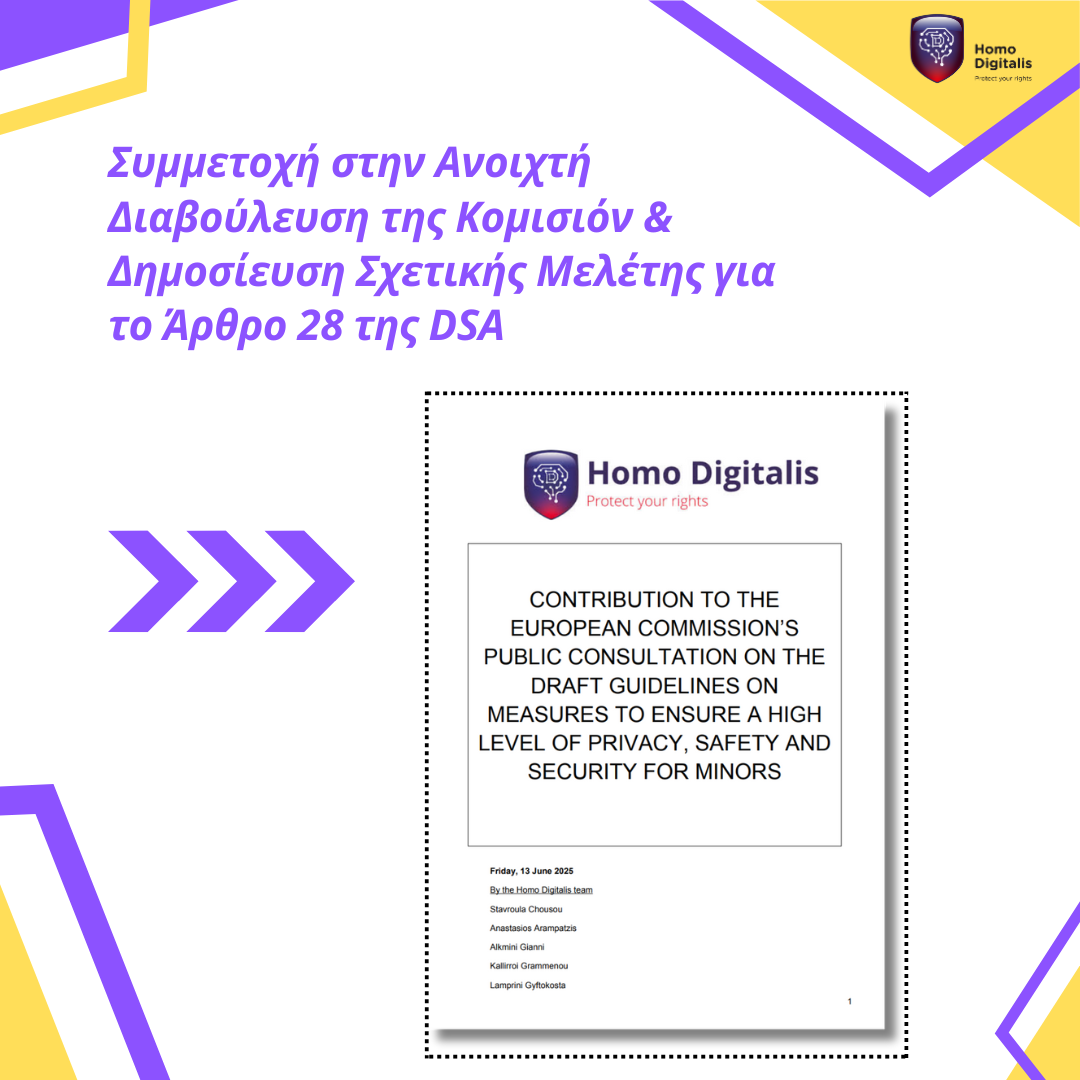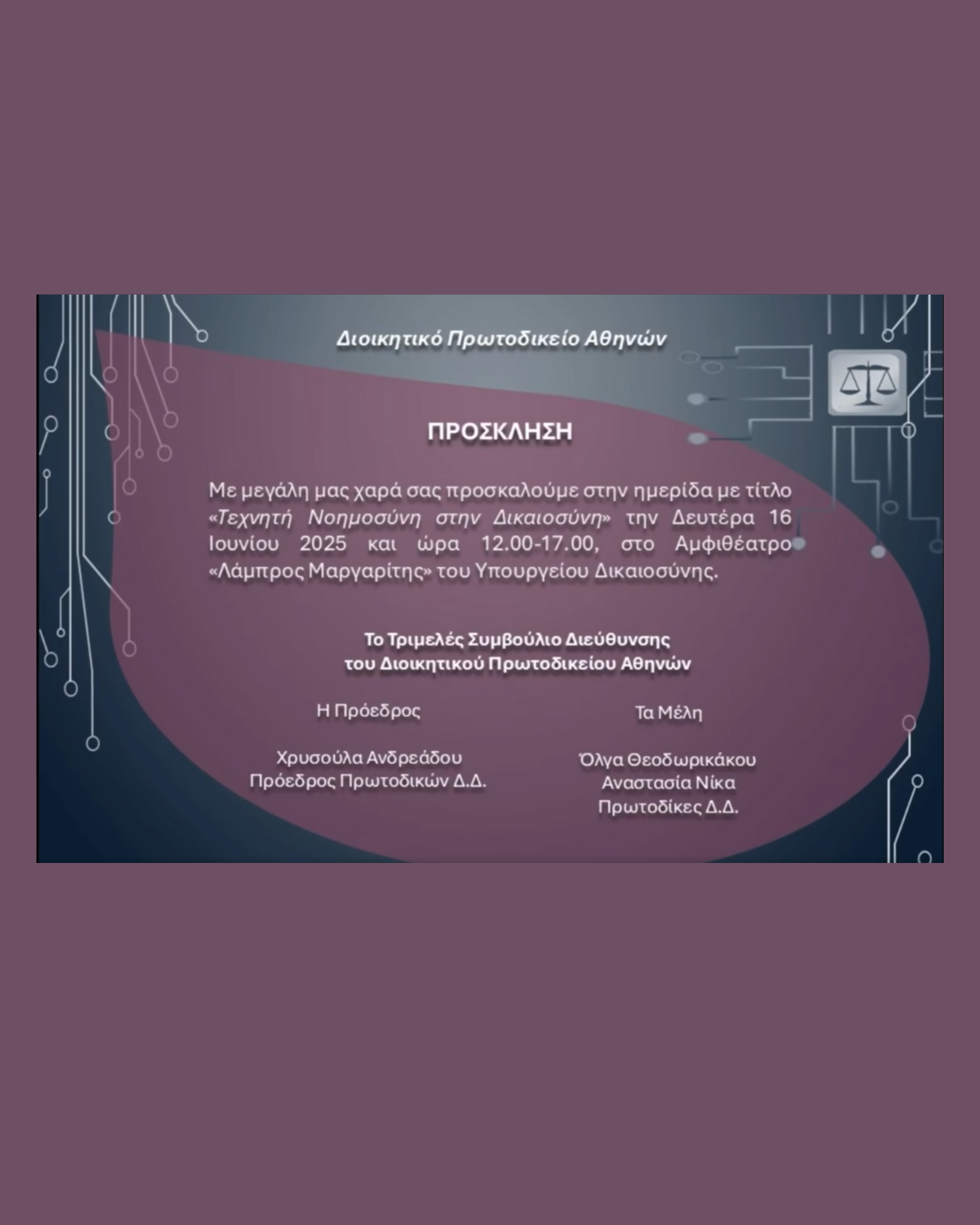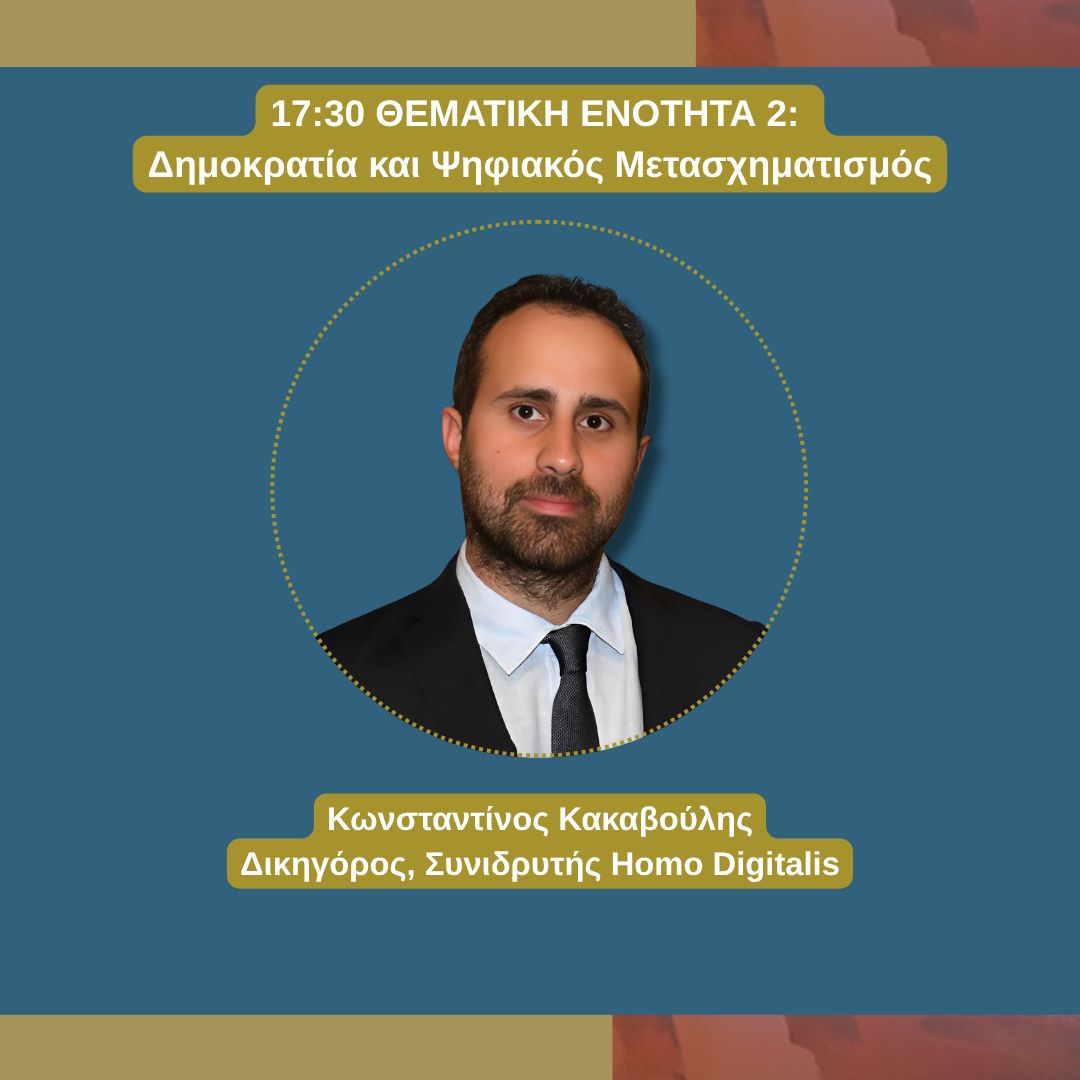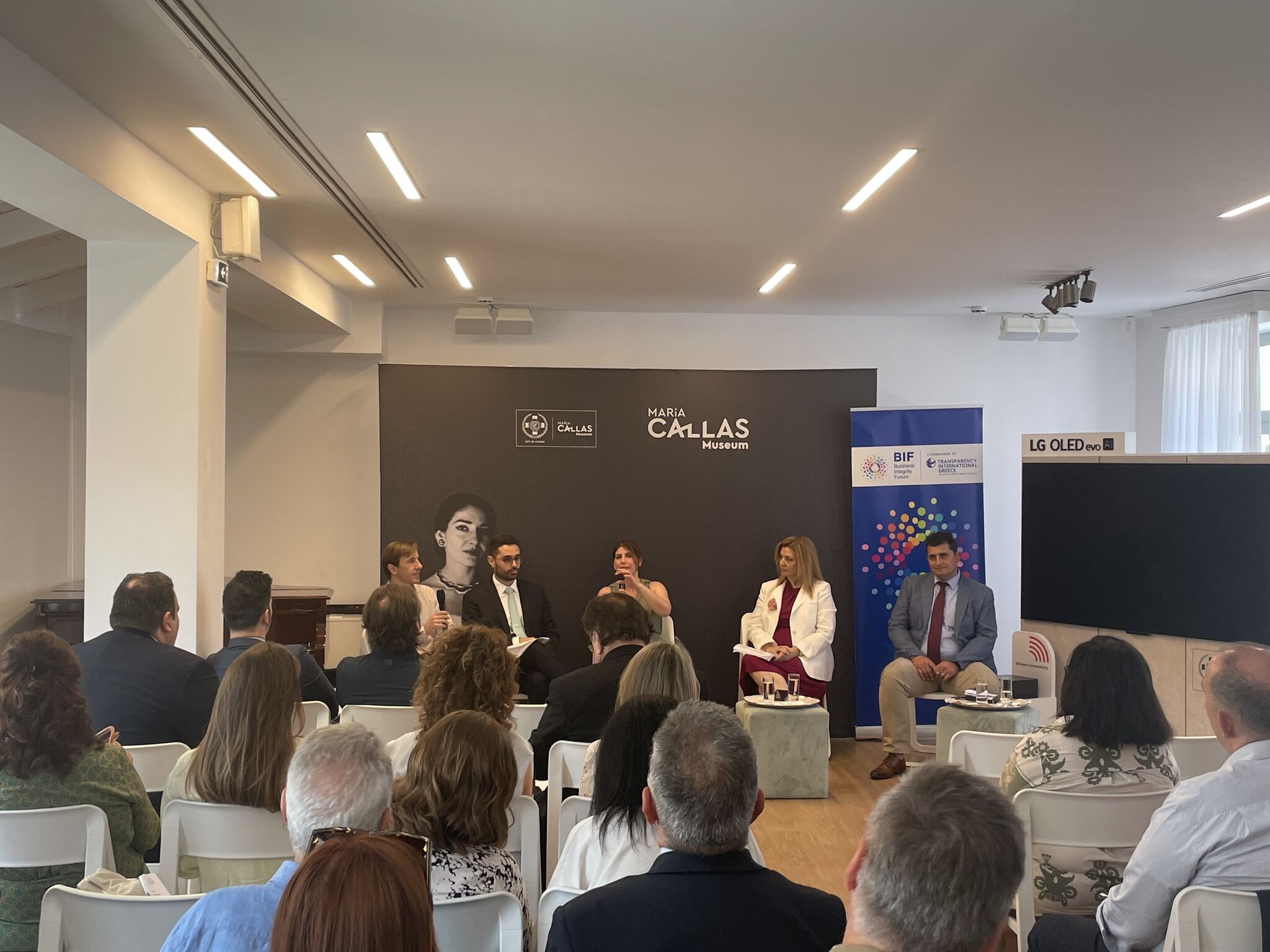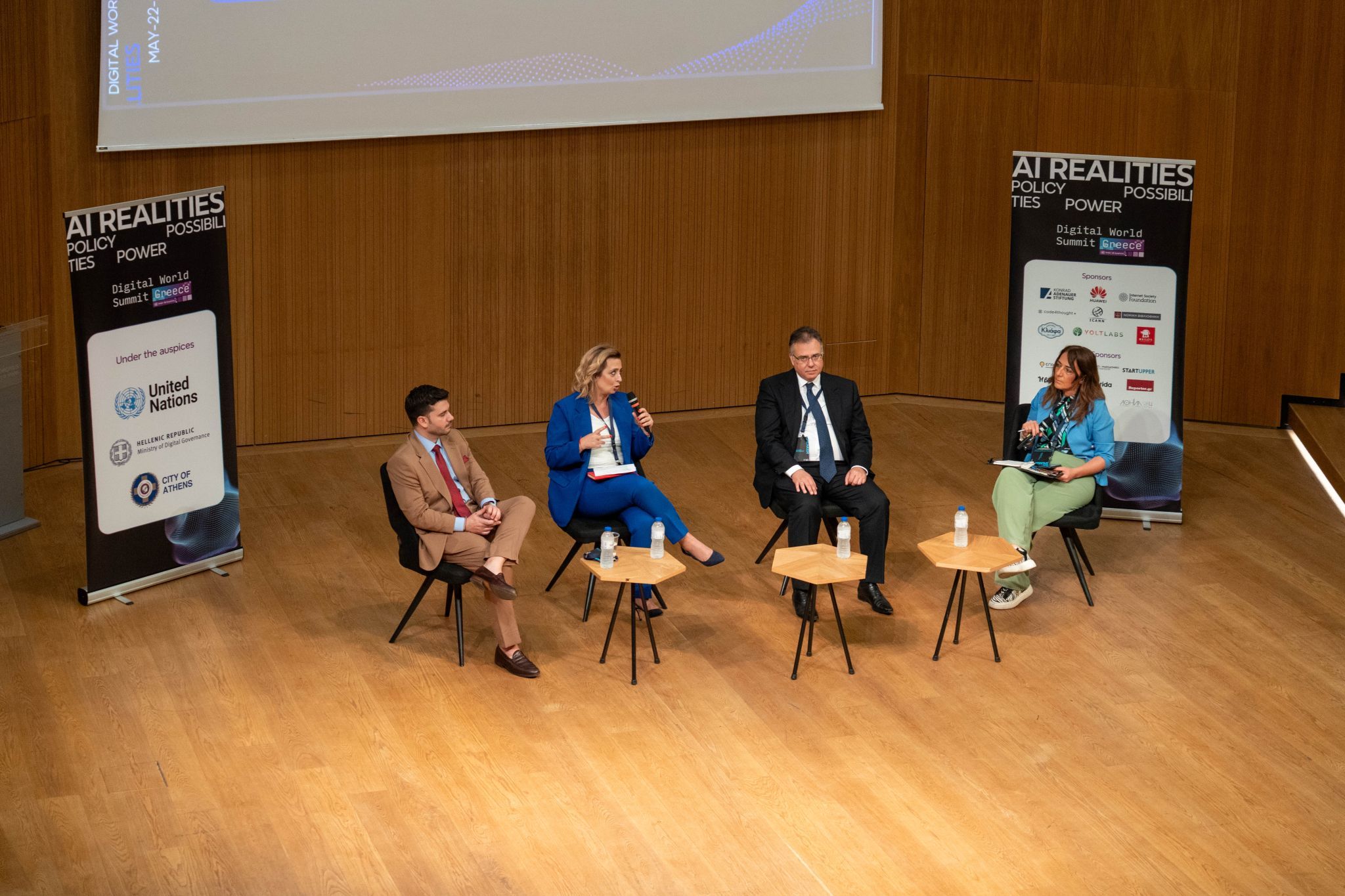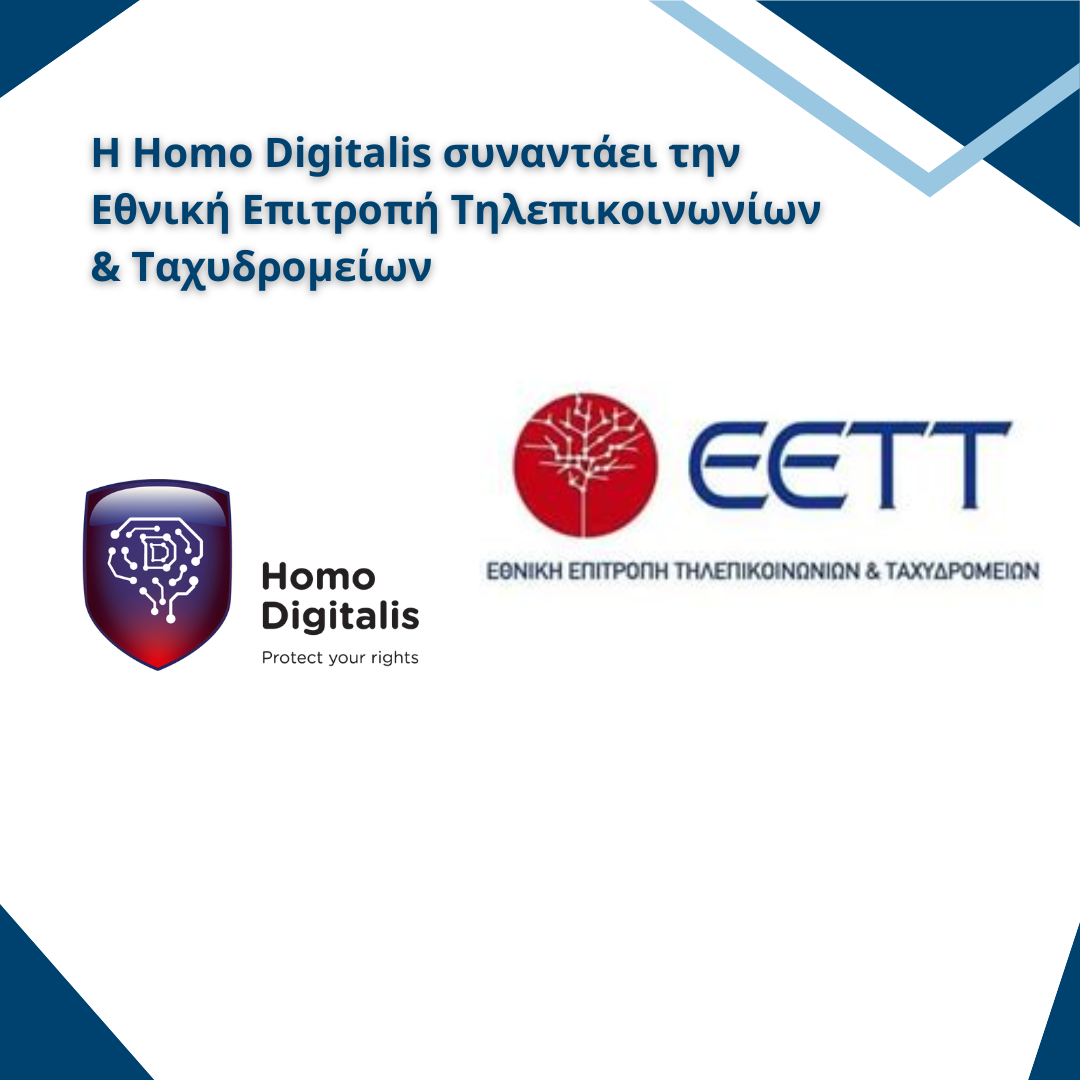We submitted our views to the European Commission’s public consultation on Article 28 of the DSA
On June 13, Homo Digitalis submitted its responses to the European Commission’s Public Consultation regarding the guidelines for the protection of minors online, within the framework of Article 28 of the Digital Services Act.
The responses to the questionnaire were accompanied by a study, which provided a more detailed explanation of the relevant proposals and concerns.
The editorial team for this action consisted of Stavrina Chousou, Anastasios Arampatzis, Alkmιnι Gianni, Kalliroi Grammenou, and Lamprini Gyftokosta.
You can read the responses to the questionnaire here.
You can read the study here.
Homo Digitalis at the 2nd International Conference of ΑΤΙ dedicated to Democracy and Social Justice
Homo Digitalis will participate in the 2nd International Conference on Democracy and Social Justice, taking place on June 10 at 15:00 at the Nikos Skalkotas Hall of the Athens Concert Hall, organized by the Alexis Tsipras Institute!
Our organization will be represented by Konstantinos Kakavoulis, Co-Founder of Homo Digitalis & Lawyer, who will deliver a speech in Thematic Session II: “Democracy and Digital Transformation.”
Also speaking in the same session:
Evagelia Emily T., Assistant Professor and Researcher at the McCourt School of Public Policy, Georgetown University
Elisavet Linos, Associate Professor of Public Policy and Management, Harvard Kennedy School of Government
Kostas Gavroglou, former Minister of Education, Research and Religious Affairs (2016–2019)
Christos Porios, Founder of Schema Labs & Open Council
You can find more information about the conference, registration, and the full program – which features internationally renowned and highly respected speakers – here.
Homo Digitalis successfully delivered its talk at CPDP2025
Two weeks ago Homo Digitalis participated again at Computers, Privacy and Data Protection Conference, speaking at the Panel “Protecting the Digital Rights of Asylum Seekers and Refugees”, organised by the Centre for Fundamental Rights – Hertie School!
Eleftherios Chelioudakis, from our team joined Francesca Palmiotto (IE University) , Derya Ozkul (University of Warwick) and Joanna Parkin (EDPS – European Data Protection Supervisor) on Friday 23.05, at the closing panel of the conference in Grande Halle!
You can read the full recap of our panel discussion here.
Congratulations to the team of organizers from Hertie School, Ida Reihani, for their great efforts and cooperation!
The 8th NGI TALER Open Call for Funding is Here! Help Us Spread the Word!
Do you have a groundbreaking idea for a free software or privacy-enhancing project that supports the mission of NGI TALER? Did you miss the first seven funding calls? No problem!
The 8th Open Call for funding launched on June 1, 2025, and you have about two months to apply! The deadline is August 1, 2025, at 12:00 noon (Central European Time).
We are looking for proposals that will revolutionize digital payment systems and contribute to an open, trustworthy, and secure internet for all.
Funding amounts range from €5,000 to €50,000! Whether you’re an SME, academic, public institution, non-profit, community group, or individual, we want your innovative ideas!
You can support GNU Taler by:
Developing supporting tools,
Improving user experience,
Integrating with free/open source applications,
Strengthening infrastructure (e.g., merchant subsystems),
And much more!
For more information about this and other calls by NGI – The Next Generation Internet, visit their website.
Read the full Call for Proposals, the Applicant Guide, the Eligibility Criteria, the FAQ, and submit your application through the NLnet Foundation website.
Join the TALER Integration Community Hub (TALER ICH) developed by petites singularités, to ask questions and connect with others.
Need inspiration? Check out 14 successful projects already working with us here.
Homo Digitalis successfully participated in the Business Integrity Forum of Transparency International
Today, Homo Digitalis took part in the 17th Round Table titled “Greek Business and Transparency: Building Trust and Competitiveness”, organized within the framework of the Business Integrity Forum, a commitment of Transparency International Greece!
Specifically, Lamprini Gyftokosta from our team moderated the panel “AI and Ethics in Business Compliance”, with contributions from Alexandros Nousias (Institute of Informatics & Telecommunications at NCSR Demokritos), Panagiotis Sourlas (Growthfund, the National Fund of Greece), Irene Papadopoulou (ΣΟΛ Crowe), and Sofoklis Karapidakis (Metlen Energy & Metals).
We warmly thank the organizers and the Executive Director of Transparency International Greece, Angelos Kaskanis, for the kind invitation!
Homo Digitalis successfully participated in the Digital World Summit Greece 2025
Last week, the Co-Founder of Homo Digitalis, Stefanos Vitoratos, spoke at the Digital World Summit Greece about the next steps in the evolution of Artificial Intelligence, what we can expect over the next decade, and best practices that can help create a safer environment.
“Artificial Intelligence is not going to wipe out human labor; as in every phase of technological transition, what changes is not the need for work, but the environment and the way it is carried out. What is required is adaptation and active participation in the new reality,” he emphasized.
You can watch highlights from the speech in the video here.
We warmly thank the organizers for this opportunity to collaborate, as well as the fellow speakers and the panel moderator for the fruitful discussion!
Homo Digitalis meets with the Hellenic Telecommunications & Post Commission
The Hellenic Telecommunications and Post Commission (EETT) welcomed the non-profit organization Homo Digitalis to its offices on May 29, 2025. In this context, we discussed with the Directorate of Digital Services and Digital Affairs of EETT its work in the field of supervising compliance with the DSA in Greece.
We are very pleased with EETT’s kind invitation to this meeting and look forward to strengthening our cooperation in the near future.

